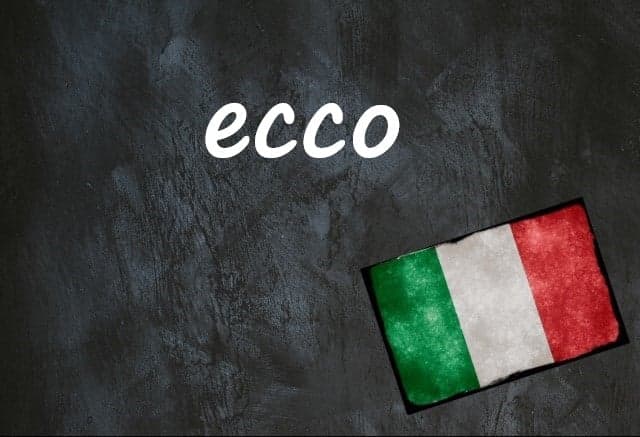Italian word of the day: 'Ecco'

Here we have a very versatile word that you'll hear all the time in Italy.
Ecco is another of those Italian words that just don't quite translate into English.
Roughly, it means “here” or “there”.
In English we pepper our speech with little phrases like “here we go” “here you are” and “there you have it”, and Italians do the same.
- Eccoci, finalmente siamo arrivati
- Here we are, we've finally arrived!
But of course, it's not really that simple.
Even in Italian, ecco (hear it pronounced here) is in a category all of its own. Quite literally.
Avverbi presentativi, or presentation adverbs, is the name of a type of adverb in Italian used to present, indicate, show, or announce something. The one and only adverb of this type still used in modern-day Italian is ecco.
You can find it used alone, but often it's attached to a pronoun: mi, ti, ci, vi, lo, la, li, le, ne
- Eccovi qui, cari amici!
- there you are, dear friends!
- Eccoli qua!
- here you have them!
These ecco phrases are often used to announce the arrival or appearance of someone or something, particularly if it's long-awaited.
- ecco il treno
- here's the train
It has more subtle meanings too. For example, this dictionary says it can “lend a nuance of irony to a situation.”
But most often I hear it used as an exclamation, to express satisfaction or surprise.
In that case, it translates to something like “look at that” or maybe even “behold!”
- Ecco! Ho dimenticato di nuovo le chiavi!
- Look at that. I forgot the keys again!
A bit like quindi or allora, it can also be used as a convenient filler word for those times when you're not sure what else to say.
- Ecco...allora
- Look... well then
An ecco can also be deployed halfway through a sentence when you want to correct or change what you were saying.
- mi è sembrato... ecco… ho saputo che...
- I felt… no... I knew that...
You can use it to start or end a discussion or explanation
- Ecco, le cose sono andate così
- Here, things went like this
- ecco tutto
- that's all
And ecco fatto (that’s it) means something is finished.
- Ecco fatto l'articolo!
- That's the article finished!
Do you have a favourite Italian word, phrase or expression you'd like us to feature? If so, please email us with your suggestion.
Comments
See Also
Ecco is another of those Italian words that just don't quite translate into English.
Roughly, it means “here” or “there”.
In English we pepper our speech with little phrases like “here we go” “here you are” and “there you have it”, and Italians do the same.
- Eccoci, finalmente siamo arrivati
- Here we are, we've finally arrived!
But of course, it's not really that simple.
Even in Italian, ecco (hear it pronounced here) is in a category all of its own. Quite literally.
Avverbi presentativi, or presentation adverbs, is the name of a type of adverb in Italian used to present, indicate, show, or announce something. The one and only adverb of this type still used in modern-day Italian is ecco.
You can find it used alone, but often it's attached to a pronoun: mi, ti, ci, vi, lo, la, li, le, ne
- Eccovi qui, cari amici!
- there you are, dear friends!
- Eccoli qua!
- here you have them!
These ecco phrases are often used to announce the arrival or appearance of someone or something, particularly if it's long-awaited.
- ecco il treno
- here's the train
It has more subtle meanings too. For example, this dictionary says it can “lend a nuance of irony to a situation.”
But most often I hear it used as an exclamation, to express satisfaction or surprise.
In that case, it translates to something like “look at that” or maybe even “behold!”
- Ecco! Ho dimenticato di nuovo le chiavi!
- Look at that. I forgot the keys again!
A bit like quindi or allora, it can also be used as a convenient filler word for those times when you're not sure what else to say.
- Ecco...allora
- Look... well then
An ecco can also be deployed halfway through a sentence when you want to correct or change what you were saying.
- mi è sembrato... ecco… ho saputo che...
- I felt… no... I knew that...
You can use it to start or end a discussion or explanation
- Ecco, le cose sono andate così
- Here, things went like this
- ecco tutto
- that's all
And ecco fatto (that’s it) means something is finished.
- Ecco fatto l'articolo!
- That's the article finished!
Do you have a favourite Italian word, phrase or expression you'd like us to feature? If so, please email us with your suggestion.

Join the conversation in our comments section below. Share your own views and experience and if you have a question or suggestion for our journalists then email us at [email protected].
Please keep comments civil, constructive and on topic – and make sure to read our terms of use before getting involved.
Please log in here to leave a comment.